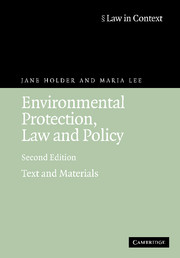Book contents
- Frontmatter
- Contents
- Table of EU legislation
- Table of international conventions
- Table of legislation
- Table of cases
- Acknowledgements
- Preface
- Part I Introduction: Law in Context
- Part II The EU Context
- Part III The International Context
- Part IV Mechanisms of Regulation I: Pollution Control
- 8 The institutional architecture of pollution control
- 9 Licensing as a regulatory technique: the example of integrated pollution prevention and control
- 10 Enforcement and implementation of direct regulation
- 11 Regulatory techniques: beyond licensing
- Part V Mechanisms of Regulation II: Controls Over Land Use and Development
- Index
11 - Regulatory techniques: beyond licensing
Published online by Cambridge University Press: 05 June 2012
- Frontmatter
- Contents
- Table of EU legislation
- Table of international conventions
- Table of legislation
- Table of cases
- Acknowledgements
- Preface
- Part I Introduction: Law in Context
- Part II The EU Context
- Part III The International Context
- Part IV Mechanisms of Regulation I: Pollution Control
- 8 The institutional architecture of pollution control
- 9 Licensing as a regulatory technique: the example of integrated pollution prevention and control
- 10 Enforcement and implementation of direct regulation
- 11 Regulatory techniques: beyond licensing
- Part V Mechanisms of Regulation II: Controls Over Land Use and Development
- Index
Summary
Introduction: ‘Command and control’?
As we have discussed in earlier chapters, ‘command and control’ regulation is subject to very considerable pressure from a number of directions. Gunther Teubner refers to this as the ‘crisis of the interventionist state’. In an environmental context, John Dryzek discusses a ‘crisis of administrative rationalism’.
John S. Dryzek, The Politics of the Earth: Environmental Discourses (Oxford University Press, 1997), pp. 79–83
Administrative Rationalism in Crisis
Among those who have recently reflected upon administrative rationalism in an environmental context, increasingly few have done so in order to defend or advance it. Part of this is due to the association with bureaucracy: it is hard to find anyone who actually likes bureaucracy (recall that even Max Weber did not welcome the bureaucratic world whose arrival he announced; indeed, he described it as an ‘iron cage’, a ‘polar night of icy darkness and hardness’). It is more common to find bureaucracy defended as necessary rather than attractive. Still, a discourse can soldier on without reflective defenders – indeed, particular discourses may persist precisely because nobody at all is reflecting on them, whether in attack or defense. Unfortunately for administrative rationalism, it is meeting with reflection, much of which turns out to be very critical.
Prosaic and uninspirational though it might be, administrative rationalism could always sustain itself so long as it delivered the goods. […]
- Type
- Chapter
- Information
- Environmental Protection, Law and PolicyText and Materials, pp. 417 - 460Publisher: Cambridge University PressPrint publication year: 2007

